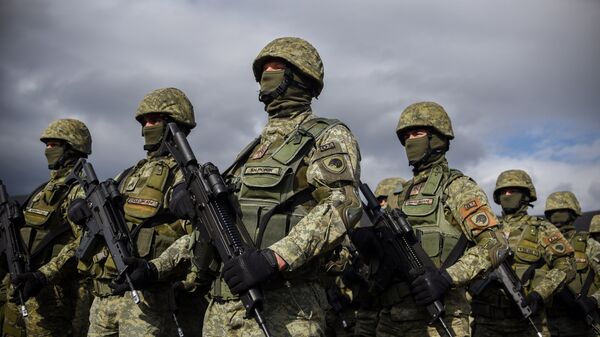"This is a very serious and very dangerous blow to the stability and security of not only Serbia, but also the entire Balkan region. All the responsibility for this event will be borne by powerful factors that support the creation of the so-called Kosovo army. I believe that the creation of the so-called army of Kosovo is a kind of continuation of one separatist terrorist organization, which is the so-called Kosovo Liberation Army. This is a continuation of the organization that made a huge purge of the Serbian and other non-Albanian population, which was engaged in the trade of drugs, weapons, human organs of the Serbs. This is not only political, but also moral absurdity," Terzic said.
The Serbian ambassador added that the issue also created a precedent for the destabilization of the rest of Europe.
"Using the example of Serbia, a very dangerous precedent was created that could cause an even deeper and more serious aggravation of the situation in all of southeastern Europe … The question is what will happen to Europe and the whole world, whether other states will be destabilized in this way. We see that such trends occur in Spain in Catalonia, in Belgium and in many other countries of Europe and the whole world," Terzic stated.
Dialogue With Serbia is at a Standstill
Belgrade is interested in continuing constructive talks with Kosovo on the dispute settlement but does not expect a sober dialogue after Kosovo’s decision to create its own national army that brings negotiations to a standstill, Serbian Ambassador to Russia Slavenko Terzic told Sputnik.
"This fact [the creation of Kosovo’s army] brings to a standstill the whole desire of Serbia to engage in a constructive dialogue with the Albanian minority, which would guarantee the security and stability of Serbia and the entire Balkan region," Terzic said.
He added that it was difficult to expect any "sober dialogue" due to Kosovo’s steps.
"I cannot say what our president and the government of Serbia will do, but still I want to emphasize that they are all interested in a constructive dialogue with representatives of the temporary institutions of Kosovo and Metohija. The dialogue, which was launched in Brussels, was stopped due to many incidents. Serbia is basically interested in the dialogue, but it is difficult for me to say how it will be conducted in the future. It is difficult to expect any sober dialogue in this situation," the Serbian ambassador said.
READ MORE: EU's Failure to Make Kosovo Respect Duties Questions Bloc's Reputation — Lavrov
In October, Kosovo's parliament voted to change the mandate of the Kosovo Security Force (KSF) and transform it into the republic's national army. On Monday, Kadri Veseli, the speaker of the Kosovar legislature, announced that the army would be officially created on December 14. The forces will reportedly comprise a total of 8,000 people — 5,000 active duty soldiers and 3,000 reservists.
Kosovo proclaimed its independence from Serbia in 2008 and was recognized by over 100 UN member states. The move was not, however, recognized by Serbia and two permanent members of the UN Security Council — Russia and China. In 2011, Brussels launched several rounds of talks between Belgrade and Kosovo, bringing the parties to the negotiating table for the first time since Kosovo's secession. The 2013 agreement came as a result of the EU-mediated consultations.



